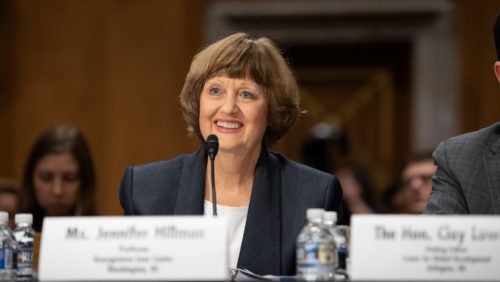Georgetown Law Professor from Practice Jennifer Hillman Testifies Before Congress on the Need for a Stronger WTO
November 28, 2018

Georgetown Law Professor from Practice Jennifer Hillman testified on November 27 on Capitol Hill, before a U.S. Senate Foreign Relations subcommittee.
“The problems that we are confronting, whether that’s the struggle around the world for good jobs that pay a living wage, whether that’s climate change, whether that’s the widening of the wealth gap or the rise of extremism and threats to national security — these are not problems…that can be solved by the United States alone,” Georgetown Law Professor from Practice Jennifer Hillman told a U.S. Senate Foreign Relations Subcommittee on November 27.
These increasingly complex problems will require global solutions, yet they arise “at a time when our international economic institutions are under siege…responding to a backlash from globalization, being attacked [due to] outdated mandates that do not address the 21st-century problems… and questioned in terms of their effectiveness, their relevance, and their legitimacy.”
The crisis is most acute at the World Trade Organization, Hillman said. What’s wrong with the WTO, and how can we remedy the problems to make it more efficient and effective? As she explained to the Subcommittee on Multilateral International Development, Multilateral Institutions and International Economic, Energy and Environmental Policy — the WTO, created in 1995 to encourage global trade, suffers from issues including a disparity of power from among its branches, a limited mandate, and no enforcement of transparency and notification requirements. The United States has recently been willing to impose tariffs that violate basic WTO rules —“a potentially dangerous unilateral and isolationist road,” Hillman noted.
A Big and Bold Case
A strengthened WTO, Hillman said, is the best way to achieve deep and broad economic reform in China.
“We ought to be bringing a big and bold case, based on a coalition of countries working together to take on China,” she said, noting that such a case “represents the best opportunity…to put sufficient pressure on China to make it clear that fundamental reform is needed.”
A comprehensive WTO case would restore confidence in the organization, allow countries to pool all the evidence, and lessen the likelihood of retaliation from China. And no case as yet has ruled on the Chinese system as a whole. When China joined the WTO in 2001, it agreed to participate as a fair, transparent and market-based trading partner.
But as Hillman and the six other panelists — ranging from State and Treasury Department officials to leaders of think tanks — explained, China is consistently violating WTO agreements by conditioning investments on technology transfers; not providing an independent judiciary to review certain decisions; discriminating against foreign technology and failing to adequately protect intellectual property. “China, you promised that you would become a market oriented economy and you have not done so,” Hillman said. “You have gone the other way.”
Expert advice
What can be done to fix the WTO? Hillman recommended measures to enforce transparency and notification requirements; new rules to fix the subsidy failings; new negotiation provisions; more power for the WTO Secretariat and an enhanced mandate for the WTO. She knows the organization — having served as one of seven members from around the world serving on the organization’s Appellate Body. At Georgetown, Hillman teaches International Business Transactions, International Trade Law, and co-teaches an International Economic Law practicum.
“The increasingly complex and interconnected problems facing the world will require more multilateralism (i.e., multiple countries working together), not less,” Hillman said. “As such, it is critical that the institutions that…have always worked in a multilateral fashion be updated so that their mandates are sufficiently broad to allow them to address the 21st century problems we face—particularly climate change and the growing wealth gap… Because the problems at the WTO are the most urgent and because the United States needs the WTO to successfully address the rise of China, this renovation work should begin at the WTO.”
The hearing may be viewed on C-SPAN.